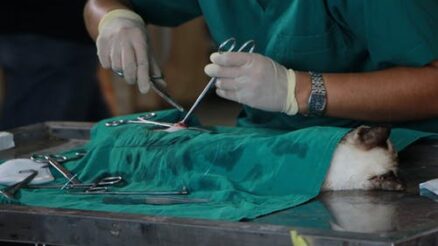Preparing your furry friend for surgery can be emotionally challenging for you and them. However, understanding the process and taking the necessary steps can make the experience less stressful for both of you.
In this article, we will discuss tips on preparing your dog for vet surgery to help you prepare mentally.
1. Understand the Procedure
Before your dog undergoes surgery, it’s essential to understand the procedure fully. Speak with your veterinarian about the specifics of the surgery, the potential risks, and the expected outcome. This will not only help you feel more confident about the process but also enable you to make informed decisions and provide the best support for your dog.
2. Follow Preoperative Instructions
Your veterinarian will provide you with a set of preoperative instructions to help ensure a successful pet surgery in Upland. These may include:
- Fasting: Your dog may need to fast for a specific period before surgery. This ensures that their stomach is empty and minimizes the risk of complications during anesthesia.
- Medications: Your vet may prescribe specific medicines or supplements to be administered before surgery. Make sure to follow these instructions closely.
- Bathing: Depending on the type of surgery, your vet may recommend bathing your dog before the procedure to reduce the risk of infection.
3. Prepare a Comfortable Environment
After surgery, your dog will need a calm and comfortable environment to rest and recover. Consider the following:
- Create a designated recovery area: Ensure this space is quiet, warm, and free from distractions.
- Provide a comfortable bed: Choose a soft, supportive bed for your dog to rest on during recovery.
- Keep other pets away: If you have other pets at home, consider separating them from your recovering dog to minimize stress and disturbances.
4. Be Prepared for Post-Operative Care
Post-operative care is crucial for your dog’s recovery. Familiarize yourself with your veterinarian’s instructions and be prepared to provide the necessary support. This may include:
- Administering medications: Your vet will likely prescribe pain relief and anti-inflammatory medications to manage discomfort and promote healing.
- Monitoring for complications: Watch out for any signs of infection, bleeding, or other complications, and contact the vet immediately if you notice anything alarming.
- Managing activity levels: Your dog may need to be on restricted activity for a period following surgery. Follow the vet’s advice on when and how to reintroduce exercise and play.
5. Utilize Vet Diagnostic Lab and Vet Radiology Services
A veterinary diagnostic lab in Upland and vet radiology services are crucial in surgical preparation and post-operative care. These advanced technologies allow your veterinarian to identify any underlying health issues, monitor your dog’s progress, and ensure a successful recovery. Examples of these services include:
- Imaging: X-rays, ultrasounds, and MRI scans can help your vet visualize your dog’s internal structures and identify potential complications before surgery. You may browse the web to learn more about veterinary radiology services.
- Blood tests: Preoperative blood tests can provide essential information about your dog’s overall health and help your vet determine the most appropriate anesthesia and pain management solutions.
6. Provide Emotional Support
Finally, your dog may feel anxious or stressed about their upcoming surgery. Providing emotional support and reassurance can help them feel more at ease. Some ways to offer comfort include:
- Spend quality time together: Enjoy some low-key cuddles, gentle petting, or sit together in a quiet space.
- Maintain a routine: Keep your dog’s routine as consistent as possible before the surgery. This can help minimize stress and anxiety.
- Use calming aids: If your dog is particularly anxious, consider using calming aids such as pheromone diffusers or supplements to help them relax.
Final Thoughts
Preparing your dog for surgery can be daunting, but following the steps outlined above can help ensure a smooth and successful process. Remember to communicate with your veterinarian and follow their instructions closely. By doing so, you’ll be well-equipped to support your dog through their surgery and recovery journey. And remember, your love and emotional support can make all the difference in helping your furry friend bounce back from their procedure.


